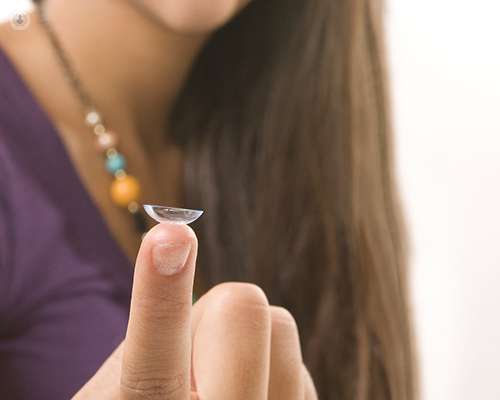Contact lenses: are they suitable for everyone?
Written by:Contact lenses can be a godsend for people with eyesight problems, liberating them from the ever-present frames of their glasses. But are contact lenses suitable for everyone? Expert ophthalmologist Dr CT Pillai explores the advantages and disadvantages of contact lenses.

What are the advantages of contact lenses?
Contact lenses are a favourable way to correct the eyesight when glasses prove to be impractical or inconvenient. They are also great for those who want their vision corrected but do not like the look of glasses on their face, or find them generally uncomfortable. Common situations where patients will opt to wear contact lenses would be when playing sports or engaging in outdoor activities such as hikes or walks. Social engagements and special occasions may also be moments where contact lenses come in handy.
Contact lenses provide a wider field of view and better peripheral vision due to the lens being in contact with the eye, thereby eliminating the irritation caused by being able to see the edge of a glasses frame. Contact lenses are now very commonly available as daily disposables, which means a new lens is used every day. This has proven to be very popular due to the convenience of not needing cleaning solutions and storage, the lowered infection incidence and the improved comfort of daily disposables.
Contact lenses are also more affordable with online suppliers. It is important to have a correct fitting carried out by your optometrist, but patients are free to purchase their contact lenses online once that process has been completed.
What are the disadvantages of contact lenses?
Compliance is very important with contact lenses. Generally, people can successfully wear contact lenses for decades with no problems. However, if the hygiene and safety instructions are not followed properly, this can lead to sight-threatening eye problems. Hand washing before handling lenses is very important for infection control. Patients who are not hygienic risk contracting an eye infection, which, if left untreated, could potentially cause loss of vision in some cases [1]. Sleeping in contact lenses also increases the risk of infection [2]. Water contact to contact lenses is also not recommended; however there are many patients who swim or shower in their contact lenses. Exposure to water (tap, swimming pool, lakes, etc.) could, in very rare instances, lead to infection, which, if left untreated, could also cause sight-threatening issues [3]. Contact lenses can also cause dry, irritated eyes if worn for long hours, especially when worn in an office environment. Contact lenses have a shelf life, as long-term and prolonged wearers may experience blood vessels growing in the cornea, which will reduce their eyes’ ability to tolerate contact lenses over time.
Can I wear contacts if I have astigmatism?
Yes, contact lenses are available for those who have astigmatism. There is now a fairly wide selection of contact lenses for those who have mild to moderate astigmatism, including daily disposables. For higher amounts of astigmatism, a made-to-order contact lens will likely be required and these tend to only be available in monthly (or longer lasting) contact lenses. It is best to see your optician for a contact lens fitting consultation, as they are best equipped to determine a suitable lens type, depending on your visual and lifestyle needs. Sometimes, vision might not be perfect due to the level of astigmatism and the lens not fitting properly over the cornea.
Who shouldn’t wear contact lenses?
Contact lenses are not advisable for patients who have a history of recurrent eye infections because this may exacerbate their condition and lead to long-term damage if not managed correctly. Those who suffer from persistent moderate-to-severe dry eyes are also not ideal candidates because contact lenses will feel quite uncomfortable and might end up making dry eyes worse [4]. Patient selection is important, those who are serious about looking after their eyes and following the advice regarding hygiene and clinical compliance are normally good candidates. Some children are able to wear contact lenses with correct adult supervision to ensure they are being sensible and not damaging their eyes.
Visit Dr Pillai’s Top Doctors profile to book an appointment.
References
[1] WOODRUFF SA, DART JKG. Acanthamoeba keratitis occurring with daily disposable contact lens wear. British Journal of Ophthalmology 1999;83:1088
[2] Youhanna W. Ibrahim, David L. Boase, and Ian A. Cree. How Could Contact Lens Wearers Be at Risk of Acanthamoeba Infection? J Optom. 2009; 2(2): 60–66
[3] Sokol JL, Mier MG, Bloom S, Asbell PA. A study of patient compliance in a contact lens-wearing population External. CLAO J. 1990;16(3):209-13
[4] Pult H, Purslow C, Berry M, Murphy PJ. Clinical tests for successful contact lens wear: relationship and predictive potential. Optom Vis Sci. 2008; 85: E924–E929


